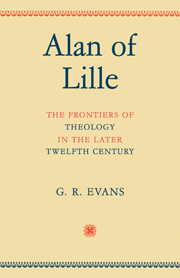Book contents
- Frontmatter
- Contents
- Dedication
- Preface
- Acknowledgements
- Abbreviations
- Biographical Notes
- Introduction
- PART I THEOLOGIA SPECULATIVA
- 1 Handmaids of Theology
- 2 Theologia Rationalis
- 3 Theologia Moralis
- PART II THEOLOGIA PRACTICA
- PART III THE PERFECT MAN
- Conclusion
- Appendix 1
- Appendix 2
- Notes
- Manuscripts cited
- Bibliography
- Index
- Frontmatter
- Contents
- Dedication
- Preface
- Acknowledgements
- Abbreviations
- Biographical Notes
- Introduction
- PART I THEOLOGIA SPECULATIVA
- 1 Handmaids of Theology
- 2 Theologia Rationalis
- 3 Theologia Moralis
- PART II THEOLOGIA PRACTICA
- PART III THE PERFECT MAN
- Conclusion
- Appendix 1
- Appendix 2
- Notes
- Manuscripts cited
- Bibliography
- Index
Summary
a dictionary
When Peter, prior of Holy Trinity, Aldgate, London, heard Gilbert Foliot preach, he was so impressed by his facility in recalling to mind the quotations he needed to support his arguments that he thought him ‘not a man, but a superman’ (non homo sed superhomo). He describes how Gilbert varied his talk by exploring various aspects of his theme (quibusdam distinctionibus variatus) and how he adorned it ‘with little flowers of words and thoughts’. Peter was most impressed, however, by the way in which Gilbert kept to the point: ‘he ran backwards and forwards from his starting-point to the same starting-point’. This gave him the idea of compiling a handbook in which texts were collected under themes, in one easily accessible volume, so that those with less capacious memories could imitate Gilbert. He found it a tedious and laborious task, as he complains in his prologue. But the need he perceived proved to be widely-felt and his Pantheologus is only one of several collections put together in the last quarter of the twelfth century. The idea was not, even then, entirely novel, but there was something new in the systematic and comprehensive character the compilers strove to give them, and in the hands of the preaching friars of the next century they developed into full concordances to the Bible.
The twelfth-century works, Peter the Chanter's Summa Abel, Peter of Poitiers' Summa super Psalterium and Alan of Lille's Distinctiones Dictionum Theologicalium, have an experimental air. Like the prior of Holy Trinity, their authors had seen a need, and each of them had seen it rather differently.
- Type
- Chapter
- Information
- Alan of LilleThe Frontiers of Theology in the Later Twelfth Century, pp. 21 - 63Publisher: Cambridge University PressPrint publication year: 1983



